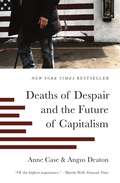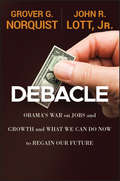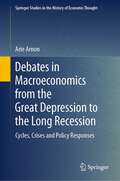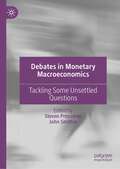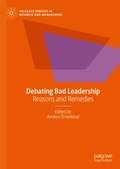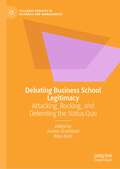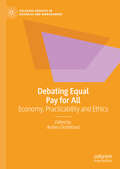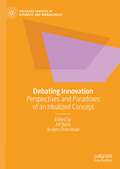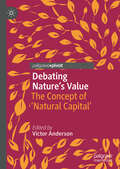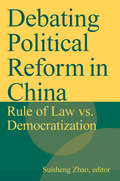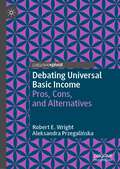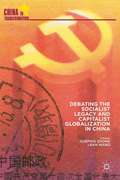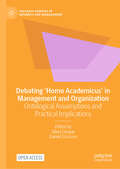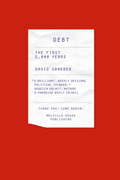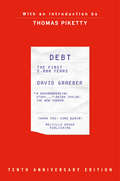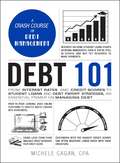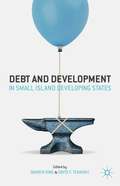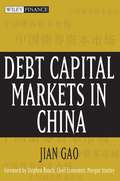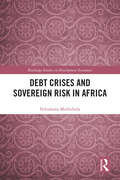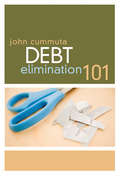- Table View
- List View
Deaths of Despair and the Future of Capitalism
by Angus Deaton Anne CaseA New York Times BestsellerA Wall Street Journal BestsellerA New York Times Notable Book of 2020A New York Times Book Review Editors’ ChoiceShortlisted for the Financial Times and McKinsey Business Book of the YearA New Statesman Book to ReadFrom economist Anne Case and Nobel Prize winner Angus Deaton, a groundbreaking account of how the flaws in capitalism are fatal for America's working classDeaths of despair from suicide, drug overdose, and alcoholism are rising dramatically in the United States, claiming hundreds of thousands of American lives. Anne Case and Angus Deaton explain the overwhelming surge in these deaths and shed light on the social and economic forces that are making life harder for the working class. As the college educated become healthier and wealthier, adults without a degree are literally dying from pain and despair. Case and Deaton tie the crisis to the weakening position of labor, the growing power of corporations, and a rapacious health-care sector that redistributes working-class wages into the pockets of the wealthy. This critically important book paints a troubling portrait of the American dream in decline, and provides solutions that can rein in capitalism's excesses and make it work for everyone.
Deaver Brown and Cross River, Inc.
by Amar V. Bhide Deaver BrownCross River makes and sells an innovative, folding baby stroller to the U.S. market. The company has broken even in its first year, selling mainly to small retailers. CEO Deaver Brown urgently wants to expand distribution to national chains and has secured appointments with the buyers of Macy's and K-Mart. What pitch should he make?
Debacle: Obama's War on Jobs and Growth and What We Can Do Now to Regain Our Future
by John R. Lott Jr. Grover Glenn NorquistA provocative critique of the Obama administration's economic policies and an examination of America's difficult economic future During the 2008 presidential campaign, Barack Obama promised "a net spending cut" to make government smaller in order to reduce the deficit. But this huge increase in government spending and debt, and the resulting prospect of higher taxes, will make America a poorer country. Are Americans happier because the government has determined where this money should be spent? According to John Lott and Americans for Tax Reform President Grover Norquist, the answer is no, and in Debacle: Obama's War on Jobs and Growth and What We Can Do Now to Regain Our Future they explain why. Obama's economic policies have raised unemployment, slowed economic growth, dramatically raised the national debt, squandered taxpayer money through poor investments, and damaged the housing market. The book explains why Obama's policies on spending, taxes, and regulation have all worked to harm the recovery, increase unemployment, and depress housing prices. The Congressional Budget Office estimates that the deficits that President Obama proposes for the years from 2011 through 2020 come to a staggering $126,000 per family of four, and John Lott and Grover Norquist make clear why the costs outweigh the benefits Explains why Keynesian economics is more a way of transferring wealth to political constituencies than a legitimate economic theory for understanding how the economy operates Posits that Obama's economic policies were more an opportunity "to do big things" than to solve the country's economic problems Arguing that the policies of the Obama administration have created widespread economic chaos, Debacle is a bleak look at American finance from Grover Norquist.
Debates in Macroeconomics from the Great Depression to the Long Recession: Cycles, Crises and Policy Responses (Springer Studies in the History of Economic Thought)
by Arie ArnonThis book assesses major schools of thought in macroeconomic theory between the Great Depression and the Long Recession, focusing on their analysis of cycles, crises and macro-policy. It explores the road from the dominance of Keynesian ideas to those of New Classical Macroeconomics (NCM) toward the end of the millennium. The book covers the early influential work of Knut Wicksell; the economic debates of the 1930s, with core contributions from John Maynard Keynes and Friedrich von Hayek; the rise of Keynesianism in the 1950s and its decline since the 1970s; the rise of Monetarism in the 1960s; and NCM’s subsequent rise to prominence. Finally, the book outlines how macroeconomics has evolved from its birth in the 1930s as a theory separate from microeconomics, resulting in a split between macro- and micro-theories, and ended up with a new hegemonic paradigm based on microfoundations. The ensuing policy thinking witnessed a transformation from "active" macro-policy after the Great Depression to a far more "passive" macro-policy during the last quarter of the twentieth century, which may have contributed to missing the signs of the impending Long Recession of 2008.“When the 2008 crisis struck, macroeconomists were caught with models that were theoretically elegant yet inappropriate to the needs of the moment. A broader historical perspective may have prevented the jettisoning of Keynesian models that had proved useful in the past and might have done so again. This highly readable book by Arie Arnon is a wonderful antidote to economists’ short time horizon and contributes mightily to restore the profession’s “collective memory” of the diversity of ideas within macroeconomics.”Professor Dani Rodrik, Harvard Kennedy School
Debates in Monetary Macroeconomics: Tackling Some Unsettled Questions
by Steven Pressman John SmithinThis edited volume presents the key unresolved debates in monetary macroeconomics, covering the five topics of budget, trade, taxes, exchange rates and monetary policy. For each topic, there are two authors — one arguing for a certain policy and one against. The book takes an approach eschewing mathematics or econometrics, instead presenting arguments in the spirit of political economy - while incorporating the most recent thinking in macroeconomics. This approach, combined with the objective of encouraging debate, makes the book ideal reading for students of monetary macroeconomics, researchers seeking alternative views, and the general public.
Debates in Values-Based Practice: Arguments For and Against
by Michael LoughlinDemands on healthcare systems are increasingly complex and diverse. Consumerism, multiculturalism and regulation challenge practitioners and policymakers. This has led to urgent debate about the value and purpose of healthcare as people seek to make serious, well-thought through decisions. This book helps readers to make rational decisions about healthcare provision in the context of complex and diverse values. It offers no easy solutions, instead presenting a range of perspectives and arguments on values-based practice, an increasingly influential approach to managing value-conflicts/differences in medicine, psychiatry, health and social care. Readers must make their own minds up about the controversies, but this book will give them a sense of the scene and the ability to defend their own position with clarity and confidence. This is a valuable resource for health practitioners and managers, academics in health services research and policy and students of management, bioethics, applied philosophy and political and social theory.
Debating Bad Leadership: Reasons and Remedies (Palgrave Debates in Business and Management)
by Anders Örtenblad“This stimulating collection tackles the question that is uppermost in most of humanity's minds and hearts right now. The novel debating approach that is taken generates a rich understanding of the range of ways in which bad leadership is created, manifested and most importantly, remedied.” - Professor Brad Jackson, Waikato Management School, The University of Waikato, New Zealand “In the midst of a world full of incompetent and incoherent leaders this book is exactly what we need: a veritable cornucopia of critical leadership studies.” - Keith Grint, Professor Emeritus, Warwick Business School, UK “While we like to have leaders who guide, looking at the present state of the world, there are far too many leaders who misguide. It makes this anthology on bad leadership more than timely. The various contributors, taking many different perspectives, highlight the ways leaders can go astray. In these very difficult times, this book will be a must read for anybody interested in this subject.” - Manfred F. R. Kets de Vries, Clinical Professor of Leadership “Debating Bad Leadership, edited by Anders Örtenblad, is a book for this time! The rise of populism and the emergence of so-called ‘strong’ leaders in many countries have created a social, political, and economic climate that begs for closer examination of the origins, characteristics, and forms of, especially, bad leadership. Taking as its starting-point the question of why there are so many bad leaders in the corporate world, the impressive collection of chapters compiled in Debating Bad Leadership canvasses a comprehensive array of issues ranging from toxic, psychopathic, leadership and ethical failure to issues of poor selection, ill-considered recruitment, leader (in)competence, conflicted or weak followership, to the very concept of leadership itself. In debating these fundamental issues, this book illuminates and educates, and offers some remedies, both theoretically and practically. Debating Bad Leadership challenges scholars, students and practitioners of leadership to continue this fundamental discussion, for the benefit of us all.” - Gabriele Lakomski Professor Emeritus, Melbourne Centre for the Study of Higher Education, University of Melbourne, Australia.In this book, leadership experts explore why there are so many bad leaders, and suggest remedies for how the current situation could be improved. Some of the experts suggest that reasons for why bad leaders are so common are searched for in people: more specifically leaders-to-become, acting leaders or followers. Others suggest that reasons are to be found in the leadership role (or expectations on those having such role), in the lack of support for leaders, or in beliefs about leadership. On the backdrop of their suggested explanations as to why there are so many bad leaders, the experts suggest remedies that could be taken to decrease the number of bad leaders as well as their negative impact. The very presumption that this book rests upon also gets its fair share of critique, by some of the experts. Anders Örtenblad is Professor of Working Life Science at the University of Agder, Norway. He is the editing founder of the book series Palgrave Debates in Business and Management.
Debating Business School Legitimacy: Attacking, Rocking, And Defending The Status Quo (Palgrave Debates In Business And Management Series)
by Anders Örtenblad Riina KorisThis book channels the debate on the relevance, value, and future of business schools. Could the Business School be like the Titanic, thought to be unsinkable, but ultimately doomed? And if it sinks, what of it? Or is it a ship which can adapt to the changing waters it sails in? In this book, authors from around the world debate the current and future legitimacy of the Business School from different contexts and perspectives. While some see very little or no hope at all to the future of the Business School as a legitimate centre for research and education, others remain critical, but see a way forward to rectify today’s concerns, such as around sustainability and inclusivity. This book highlights to readers thought-provoking complexities on the Business School playground and its legitimacy.
Debating Business School Legitimacy: Attacking, Rocking, and Defending the Status Quo (Palgrave Debates in Business and Management)
by Anders Örtenblad Riina KorisThis book channels the debate on the relevance, value, and future of business schools. Could the Business School be like the Titanic, thought to be unsinkable, but ultimately doomed? And if it sinks, what of it? Or is it a ship which can adapt to the changing waters it sails in? In this book, authors from around the world debate the current and future legitimacy of the Business School from different contexts and perspectives. While some see very little or no hope at all to the future of the Business School as a legitimate centre for research and education, others remain critical, but see a way forward to rectify today’s concerns, such as around sustainability and inclusivity. This book highlights to readers thought-provoking complexities on the Business School playground and its legitimacy.
Debating Equal Pay for All: Economy, Practicability and Ethics (Palgrave Debates in Business and Management)
by Anders ÖrtenbladThis anthology debates the idea of giving all people – no matter which profession or position they have (and whether they have a job or not) – the same pay. Some contributors argue against equal pay for all, some for increased pay equality but not for total pay equality, and some argue for equal pay for all. There is no common conclusion in the book; instead, the book aims to encourage reflection as well as further debate on something that is often taken for granted, namely differentiated pay, by offering a set of various standpoints in the debate, backed-up with various kinds of arguments. Among bases for arguments that are put forward in the book, economy, practicability and ethics belong to the most frequently occurring ones. This book is the first one to be published in the book series Palgrave Debates in Business and Management.
Debating Innovation: Perspectives and Paradoxes of an Idealized Concept (Palgrave Debates in Business and Management)
by Anders Örtenblad Alf RehnDespite its complexity, innovation is often depicted within academic literature as a phenomenon that is innately good and always necessary. This thought-provoking volume presents a more nuanced view – through a number of paired chapters for and against, as well as more general critiques of innovation and several suggested new lines of inquiry, the book will be of interest to all with a broader interest in innovation.
Debating Nature’s Value: The Concept Of 'natural Capital'
by Victor AndersonThe concept of 'Natural Capital' has come to play a central role in current debates about biodiversity and nature conservation. It implies an approach to the natural world based on the valuation of places and species in terms of money. This is, in a variety of ways, both attractive and problematic. This edited collection comprehensively discusses the issues raised by the concept of 'Natural Capital', with contributors presenting not only arguments for and against the widespread adoption of the idea, but also viewpoints arguing for nuanced, pragmatic and middle-ground positions.
Debating Political Reform in China: Rule of Law vs. Democratization
by Suisheng ZhaoThe growing disconnect between China's market-oriented economy with its emerging civil society, and the brittle, anacronistic, and authoritarian state has given rise to intense discussion and debate about political reform, not only by Western observers, but also among Chinese intellectuals. While some expect China's political reform to lead to democratization, others have proposed to strengthen the institution of single-party rule and provide it with a solid legal base. This book brings the ongoing debate to life and explores the options for political reform. Offering the perspectives of both Western and Chinese scholars, it presents the controversial argument for building a consultive rule of law regime as an alternative to liberal democracy. It provides several critiques of this thesis, and then tests the thesis through empirical studies on the development of the rule of law in China.
Debating Universal Basic Income: Pros, Cons, and Alternatives (Exploring the Basic Income Guarantee)
by Robert E. Wright Aleksandra PrzegalińskaThis book presents the most compelling arguments for and against implementing a basic income guarantee today, in the voice of proponents and critics, in alternating chapters. Tables, figures, and pictures illustrate the key concepts and evidence, which include benefit cliffs and disincentive deserts, time series macroeconomic data, business, economic, and technological change (BETC), artificial intelligence and other general purpose technologies, along with advanced robotics, the environmental Kuznets Curve, income distributions, democracy, social justice, dependence, autonomy, and economic freedom. A neutral, non-partisan tone introduction defines UBI and covers the history of universal income plans, while the conclusion summarizes the main arguments for and against UBI before surveying alternative policies, including universal basic asset, credit, service, job, and training plans.
Debating the Socialist Legacy and Capitalist Globalization in China
by Xueping Zhong Ban WangThe first English collection of translated essays, by Chinese literary scholars, writers, and critics, this volume focuses on the legacy of socialist culture and post-socialist phenomena within the context of capitalist globalization. By rethinking socialism, literature, and culture in relation to the intellectual and cultural trends since the start of the reform and by debating the rise of the 'new left' culture, this book seeks to offer critical voices while evoking the themes of the socialist past to bear on the 21st-century Chinese intellectual and cultural scenes.
Debating ‘Homo Academicus’ in Management and Organization: Ontological Assumptions and Practical Implications (Palgrave Debates in Business and Management)
by Daniel Ericsson Silvia CinqueIn the fields of management and organization, there is an ongoing debate about different ontological assumptions about people in and around organizations, and the dangers of self-fulling prophecies, i.e., the phenomena in which unsubstantiated, unethical, or dysfunctional assumptions about people can lead to adverse practical consequences. This open access book advances this debate, but in a self-reflexive direction, asking: Who do we, as scholars in the fields of management and organization, think we are? What ontological assumptions about ourselves do we live by? Do we think we are something “special”, a 'Homo Academicus', distinctively separated from the life-world of managers and employees but linked with other academics such as, say, philosophers and sociologists? If so, what are the consequences and implications of such assumptions? Part of the popular Palgrave Debates in Business and Management series, each of the chapters disclose, problematize, and criticize different ontological assumptions about 'Homo Academicus' that underpins research in the fields of management and organization. It will be of great interest to management and organization scholars and students, as well as those with a broader interest in methodology and critical studies.
Deborah Quazzo at GSV Ventures
by William A. Sahlman Michael D. Smith Nicole Tempest KellerFacing a surge in investor interest in EdTech during the COVID-19 pandemic, GSV Ventures must decide whether to raise a larger Fund #2
Debt
by David GraeberBefore there was money, there was debt Every economics textbook says the same thing: Money was invented to replace onerous and complicated barter systems--to relieve ancient people from having to haul their goods to market. The problem with this version of history? There's not a shred of evidence to support it. Here anthropologist David Graeber presents a stunning reversal of conventional wisdom. He shows that for more than 5,000 years, since the beginnings of the first agrarian empires, humans have used elaborate credit systems to buy and sell goods--that is, long before the invention of coins or cash. It is in this era, Graeber argues, that we also first encounter a society divided into debtors and creditors. Graeber shows that arguments about debt and debt forgiveness have been at the center of political debates from Italy to China, as well as sparking innumerable insurrections. He also brilliantly demonstrates that the language of the ancient works of law and religion (words like "guilt," "sin," and "redemption") derive in large part from ancient debates about debt, and shape even our most basic ideas of right and wrong. We are still fighting these battles today without knowing it. Debt: The First 5,000 Years is a fascinating chronicle of this little known history--as well as how it has defined human history, and what it means for the credit crisis of the present day and the future of our economy.From the Hardcover edition.
Debt - Updated and Expanded: The First 5,000 Years
by David GraeberNow in paperback, the updated and expanded edition : David Graeber’s “fresh . . . fascinating . . . thought-provoking . . . and exceedingly timely” (Financial Times) history of debt Here anthropologist David Graeber presents a stunning reversal of conventional wisdom: he shows that before there was money, there was debt. For more than 5,000 years, since the beginnings of the first agrarian empires, humans have used elaborate credit systems to buy and sell goods—that is, long before the invention of coins or cash. It is in this era, Graeber argues, that we also first encounter a society divided into debtors and creditors. Graeber shows that arguments about debt and debt forgiveness have been at the center of political debates from Italy to China, as well as sparking innumerable insurrections. He also brilliantly demonstrates that the language of the ancient works of law and religion (words like “guilt,” “sin,” and “redemption”) derive in large part from ancient debates about debt, and shape even our most basic ideas of right and wrong. We are still fighting these battles today without knowing it.
Debt 101: From Interest Rates and Credit Scores to Student Loans and Debt Payoff Strategies, an Essential Primer on Managing Debt (Adams 101)
by Michele CaganGet out of debt and use credit wisely with this easy-to-understand, comprehensive guide to making your debt work for you. The key to borrowing, managing, and paying off debt is understanding what it is, how it works and how it can affect your finances and your life. Debt 101 is the easy-to-follow guide to discovering how to pay off the debt you have plus learning how to use debt to your advantage. Debt 101 allows you to take control of your money with strategies best suited for your personal financial situation—whether you are buying a home or paying off student loans. You will learn the ins and outs of borrowing in a simple, straightforward manner, managing student loans and credit card debt, improving your credit score, understanding interest rates, good debt vs. bad debt, and so much more. Finally, you can get ahead of the incoming bills and never let your debt intimidate you again!
Debt And Development In Small Island Developing States
by Damien King David F. TennantDebt and Development in Small Island Developing States draws on the expertise of established researchers and public officials from within the SIDS community to answer the following pressing questions related to sustainability, debt accumulation, and prospects for future growth.
Debt Capital Markets in China
by Jian Gao Stephen S. RoachAn in-depth look at China's burgeoning capital marketsAuthor Jian Gao is the number one authority on fixed income markets in China, and with this book, he brings his considerable experience and knowledge about these markets to investors worldwide. For those interested in becoming active in China's growing fixed income markets, Debt Capital Markets in China is the book you need to get started. It includes coverage of the primary and secondary markets, government debt instruments, corporate bonds, the collateralized bond market, and asset-backed securitizations. Debt Capital Markets in China also examines the developing market trends, which affect investors and institutions looking to make the most of this incredible financial opportunity.Dr. Jian Gao, PhD (Beijing, China) is the Vice Governor of China Development Bank (CDB).
Debt Crises and Sovereign Risk in Africa (Routledge Studies in Development Economics)
by Ndzalama MathebulaThis book examines the resurgence of debt crises in Africa following the Covid-19 pandemic. It deciphers the debt crisis phenomenon through the discourse of sovereign risk, which has been paid insufficient attention within the African context. It seeks to appreciate facets that continue to lead African states to a debt-default position.The book focuses on the pre-stages of default and debt default risks. It explores and investigates whether South Africa was and continues to be financially capable of servicing its International Monetary Fund (IMF) loan, granted in 2020 for the COVID-19 pandemic. While investigating how and why Ethiopia and Ghana have already defaulted on their post-pandemic loans from the IMF. It examines the idea of sovereign risk in Africa through a qualitative methodology and a case study research design, analyzing three countries borrowed from the IMF in 2020 or later, mainly prompted by the pandemic. The book distinguishes between African states that have not yet defaulted and those that have already defaulted on their debt servicing. Namely, South Africa, Ethiopia, and Ghana, two of which have already defaulted on their loan. The book also notes the resurgence of the IMF within the African continent while assessing the past narrative and impact of the international monetary system and how it has changed in the post-pandemic era. However, economic diversification has been noted as a prominent remedy that holds the potential of strengthening African economies and aiding their eradication of the debt crisis.The book is designed to appeal to numerous reading communities, namely scholars, researchers, advanced students and policymakers.
Debt Crises and the Development of International Capital Markets
by Amadou N. R. Sy Andrea PescatoriA report from the International Monetary Fund.
Debt Elimination 101
by John CummutaDebt Elimination 101 is a concise guide to breaking free of debt and building a financially secure future. Drawn from Are You Being Seduced into Debt? by John Cummuta, this handbook will help readers begin spending and saving in a truly biblical manner.
